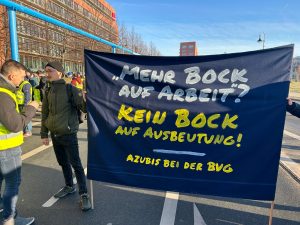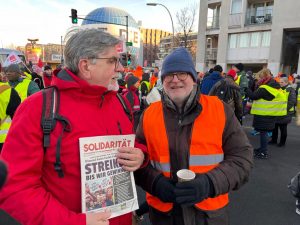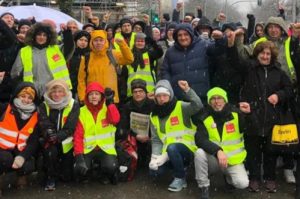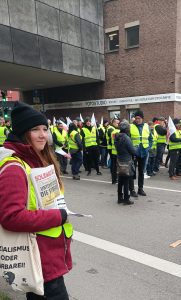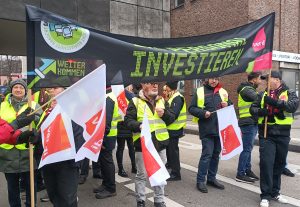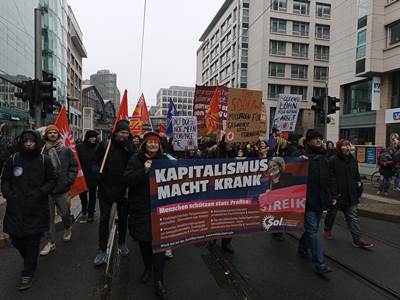
While the ballot for unlimited strike action amongst the German postal workers saw a 85.9 percent yes vote for strike action over their 15 percent wage claim, public sector workers have stepped up their warning strikes all over the country in their fight for a 10.5 percent increase with a minimum of a 500 Euro pay monthly rise.
Anger is boiling up amongst workers as the employers’ offers have been nothing but provocations. This led to the ver.di trade union stopping negotiations for postal workers and starting the ballot. The Deutsche Post management has now proposed to continue negotiations and the ver.di leadership agreed to that despite the ballot.
At the same time, in the public sector, the trade union has stepped up warning strikes prior to the third round of negotiations, which will come at the end of the month. Meanwhile the rail employers of Deutsche Bahn have offered nothing in the first negotiations. This has led to increasing pressure from the rank and file of the EVG rail trade union and the leadership had to call for a first demonstration on 14 March and might start warning strikes earlier than originally planned.
On 3 March, also for the first time, public transport workers joined the ‘Friday For Future’ climate protests in joint strikes and demonstrations of youth and workers. Linking up their struggles is a significant development both for FFF and the trade union. They correctly argue that solving the climate crisis must not be done on the back of workers and is no contradiction to the social question. Concretely they demand an expansion of public transport for free or cheaper fares and that this is only possible with more personnel and good wages and conditions for the workers. This development clearly worries the ruling class. This was reflected in a commentary in one of the main news programmes on public television, where the commentator warned the youth of FFF of so-called false friends, who will exploit the just demands of the youth for their narrow interests.
Members of Sol (Socialist Organisation Solidarity – CWI in Germany) intervened in these strikes. Young Sol members used the opportunity to reach out to young people, with the recently launched new youth organisation, ‘Youth For Socialism’.
On International Women’s Day, on 8th March, public sector workers also struck in many sectors and linked up with the demonstrations for women’s rights and against sexism and discrimination.
Sol members intervened up and down the country in strikes and demonstrations. Our comrades working in the public sector organised their co-workers for strikes and are active in trade union structures. In Mainz, our members are part of the local, ‘Enough is Enough’ coalition, and organised a solidarity demonstration together with the ver.di district organisation.
Sol members intervene by distributing the leaflets of the Network for a Fighting and Democratic ver.di and the Network for Fighting Trade Unions (VKG), two networks of combative and left trade unionists which put forward proposals for the strike movement. These include the need to go beyond warning strikes and organise ballots and all-out strike action to win the fight and achieve the full demands; the need for democratic structures and decision-making in the strike movement; and the proposal to link up the different struggles of postal, public sector and rail workers (and retail workers, which have just started their wage round) in joint demonstrations and strikes.
With our paper, Solidarität, we also spread socialist ideas amongst striking workers. At a public meeting of the Berlin Sol branch, there were workers’ leaders from the Berlin bin workers, postal workers, and railway workers speaking on the platform.
Below are photos of strikes and the intervention of Sol members in various cities:
